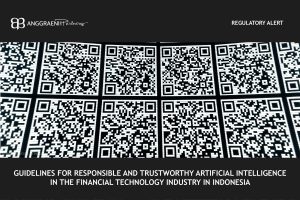Regulatory Alert : Guidelines for Responsible and Trustworthy Artificial Intelligence in the Financial Technology Industry in Indonesia
Setyawati Fitrianggraeni, Sri Purnama, Jericho Xavier Ralf[1]
BACKGROUND
Artificial Intelligence (AI), a blend of computer science, machine learning, and big data, is increasingly being adopted in various industries, especially in financial technology (Fintech). This shift towards AI-driven processes aims to enhance business efficiency and transaction speed. However, it also introduces unprecedented risks, necessitating a behavioural framework or code of conduct to optimise AI usage and mitigate risks.
On 24 November 2023 at the Fifth Indonesia Fintech Summit & Expo 2023, Indonesia’s Financial Services Authority (Otoritas Jasa Keuangan or OJK), in partnership with several other organisations,[2] launched its code-of-ethics guidelines (Guidelines) to work towards responsible and trustworthy artificial intelligence within the Fintech sector.[3] This framework aligns with global standards adopted by the Organisation for Economic Co-operation and Development (OECD) AI Principle[4] and the
KEY PRINCIPLES
The fundamental principles for the use of Responsible and Trustworthy AI in Fintech include:
- Alignment with Pancasila:[7] Ensuring AI development and usage align with national interests and ethical responsibilities based on Pancasila values.[8]
- Beneficial: AI applications should add value to business operations, enhance consumer welfare, improve decision-making abilities, reduce inequality, increase financial inclusion, and support sustainable economic growth.[9]
- Fair and Accountable: AI applications must be fair and non-discriminatory, protect consumer privacy, and prevent harm. There should be a risk mitigation framework to ensure relevant and proportional contributions of AI applications.[10]
- Transparent and Explicable: Fintech companies must have control over AI processing and be able to explain it to consumers, from input to output, including risk and mitigation strategies.[11]
- Robustness and Security: AI applications should be robust, secure against cyber-attacks, and developed by competent or certified experts in AI. Continuous testing and validation are required for technical processing and security aspects.[12]
IMPLICATION
These guidelines require Fintech companies to adopt ethical, fair, transparent, accountable, robust, and secure AI practices. This involves regular updates, testing, and validation of AI models and algorithms, ensuring data integrity and privacy, and maintaining scalability and human involvement in decision-making processes.
CONSIDER
Fintech firms should consider the following:
- Ethical principles and justice in AI usage
Fintech firms must ensure that their AI systems adhere to ethical standards and principles of justice. This means designing and operating AI in a way that respects human rights, promotes fairness, and avoids biases.
- Continuous learning and improvement of AI algorithms
Fintech companies must implement processes for regular assessment and enhancement of their AI algorithms. This refinement helps adapt to changing market dynamics, evolving regulatory landscapes, and emerging technological advancements.
- Data privacy and processing are in line with regulations
Fintech firms must manage and process data responsibly, ensuring the privacy and security of customer information. This includes adhering to relevant laws and guidelines related to data collection, storage, usage, and sharing. Companies must also be transparent about their data processing activities.
- User satisfaction and experience
The design and implementation of AI systems should focus on enhancing user experience and satisfaction.
- Disclosure of AI activities and legal accountability mechanisms.
Fintech companies should openly disclose how their AI systems function, the kind of data they use, and the decision-making criteria. Furthermore, there should be precise legal accountability mechanisms for decisions made by AI systems, including protocols for addressing errors or biases in AI outputs and handling customer grievances related to AI decisions.
CONCLUSION
Adopting these guidelines is crucial for responsible and trustworthy AI implementation in the Fintech industry. It ensures the ethical use of AI, protecting consumer interests and promoting sustainable growth while mitigating potential risks associated with AI technologies. Compliance with these principles will foster trust and reliability in AI-driven financial services.
DISCLAIMER:
This disclaimer applies to the publication of articles by Anggraeni and Partners. By accessing or reading any articles published by Anggraeni and Partners, you acknowledge and agree to the terms of this disclaimer:
No Legal Advice: The articles published by Anggraeni and Partners are for informational purposes only and do not constitute legal advice. The information provided in the articles is not intended to create an attorney-client relationship between Anggraeni and Partners and the reader. The articles should not be relied upon as a substitute for seeking professional legal advice. For specific legal advice tailored to your individual circumstances, please consult a qualified attorney.
Accuracy and Completeness: Anggraeni and Partners strive to ensure the accuracy and completeness of the information presented in the articles. However, we do not warrant or guarantee the accuracy, currency, or completeness of the information. Laws and legal interpretations may vary, and the information in the articles may not be applicable to your jurisdiction or specific situation. Therefore, Anggraeni and Partners disclaim any liability for any errors or omissions in the articles.
No Endorsement: Any references or mentions of third-party organizations, products, services, or websites in the articles are for informational purposes only and do not constitute an endorsement or recommendation by Anggraeni and Partners. We do not assume responsibility for the accuracy, quality, or reliability of any third-party information or services mentioned in the articles.
No Liability: Anggraeni and Partners, its partners, attorneys, employees, or affiliates shall not be liable for any direct, indirect, incidental, consequential, or special damages arising out of or in connection with the use of the articles or reliance on any information contained therein. This includes but is not limited to, loss of data, loss of profits, or damages resulting from the use or inability to use the articles.
No Attorney-Client Relationship: Reading or accessing the articles does not establish an attorney-client relationship between Anggraeni and Partners and the reader. The information provided in the articles is general in nature and may not be applicable to your specific legal situation. Any communication with Anggraeni and Partners through the articles or any contact form on the website does not create an attorney-client relationship or establish confidentiality.
By accessing or reading the articles, you acknowledge that you have read, understood, and agreed to this disclaimer. If you do not agree with any part of this disclaimer, please refrain from accessing or reading the articles published by Anggraeni and Partners.
For further information, please contact:
WWW.AP-LAWSOLUTION.COM
P: 6221. 7278 7678, 72795001
H: +62 811 8800 427
Anggraeni and Partners, an Indonesian law practice with a worldwide vision, provides comprehensive legal solutions using forward-thinking strategies. We help clients manage legal risk and resolve disputes on admiralty and maritime law, complicated energy and commercial issues, arbitration and litigation, tortious claims handling, and cyber tech law.
S.F. Anggraeni
Managing Partner
Sri Purnama
Junior Legal Research Analyst
Jericho Xafier Ralf
Junior Associate
[1] Setyawati Fitrianggraeni holds the position of Managing Partner at Anggraeni and Partners in Indonesia. She also serves as an Assistant Professor at the Faculty of Law, University of Indonesia, and is currently pursuing a PhD at the World Maritime University in Malmo, Sweden. This article is co-authored by Sri Purnama, Junior Legal Research and Jericho Xafier Ralf, Trainee Associate Analyst at Anggraeni and Partners.
[2] Indonesian Fintech Association (AFTECH), Indonesian Sharia Fintech Association (AFSI), Indonesian Joint Funding Fintech Association (AFPI), and Indonesian Crowdfunding Services Association (ALUDI).
[3] The reference in this document pertains to the version dated 6 December 2023, as obtained from the Otoritas Jasa Keuangan website, accessible at Panduan Kode Etik Kecerdasan Buatan (Artificial Intelligence/AI) yang Bertanggung Jawab dan Terpercaya di Industri Teknologi Finansial (ojk.go.id). Please note that subsequent amendments or updates to the ethical guidelines may have occurred after this date. Readers are advised to consult the latest version of the document for the most current information.
[4] A legal instrument that promotes Innovative and trustworthy AI which also respects human rights and democratic value. This instrument was adopted back in May of 2019 by the OECD member countries which was then amended on 8th of November 2023.
[5] NIST is one of the United States’ (U.S.) oldest physical science laboratories which was founded in 1901 and is now a part of the U.S. Department of Commerce. NIST was established by Congress to remove a major challenge to U.S. industrial competitiveness during 1901. In the present, NIST’s mission is to promote U.S. innovation and industrial competitiveness by advancing measurement science, standards, and technology in ways that enhance economic security and improve quality of life. NIST, “About NIST”, https://www.nist.gov/about-nist accessed on 8 December 2023.
[6] National Institute of Standards and Technology (NIST) AI Risk Management Framework (AI RMF) is a framework developed by NIST through consensus-driven, open, transparent, and collaborative process to better manage risks to individuals, organisations, and society associated with artificial intelligence (AI).
[7] Pancasila is the Indonesia’s founding concept compromises of 5 principles: monotheism, civilised humanity, national unity, deliberative democracy, and social justice. This concept came about at the onset of Indonesia’s independence from the Netherlands in 1945 to unify the population and emphasise moderation and tolerance.
[8] Otoritas Jasa Keuangan,”Kecerdasan Buatan (Artificial Intelligence/AI) yang Bertanggung Jawab dan Terpercaya”. BUKU – Edt V2 (ojk.go.id), pp. 2, accessed on 6 December 2023.
[9] Ibid.
[10] Ibid., pp. 3.
[11] Ibid.
[12] Ibid., pp. 4.




